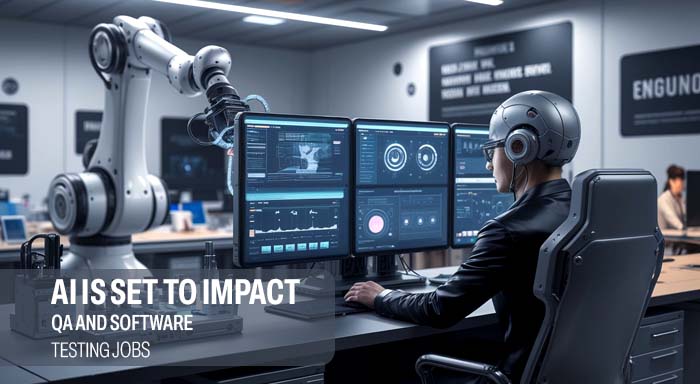It is only in its infancy, yet there are very few industries where artificial intelligence isn’t making a huge impact.
QA and testing phases are essential for secure and reliable production, but they can be time-consuming, and human error is possible.
AI can streamline the workflow, automate processes, and make sure efficiency is at the forefront.
While its benefits are inarguable, its integration raises many questions about its impact on the industry and human jobs in the field.
Today we’ll discuss whether jobs are at risk as AI roles emerge and how professionals can adapt for the AI-driven future on our doorsteps.
Reshaping QA and Software Testing
There are no two ways about it, AI is far faster and more accurate than its human counterparts at detecting potential defects and it can take care of the repetitive tasks with automation.
Ultimately, this dramatic reshaping will boost productivity levels, but the integration does present uncertainty for employees in the job market.
Test Automation
In the quality assurance landscape, automated testing is probably AI's biggest contribution. With AI on board, it is no longer a labor-intensive, manual task.
Regression testing and other repetitive and longwinded duties can be effectively taken care of in the background, freeing workers to look at strategic and problem-solving elements of their roles with better focus.
The advantages of AI-driven test automation tools are obvious; many are already on the bandwagon. In fact, 85% of the companies have already integrated AI into their stacks one way or the other.
However, this makes those jobs redundant for human esters. To stay in the field, they now have to focus on tasks that can’t be easily automated or consider alternatives like training to test AI models instead.
Predictive QA
The predictive analysis capabilities of AI can help predict errors before they arise through machine learning.
By analyzing historical datasets, it can learn, improve and adapt. The MLM pattern recognition is incredible and can spot potential defects and highlight areas of software that could possibly fail.
The predictive-driven operation eliminates errors, reduces testing time and costs, and at the end of the day, ensures the delivery of pristine products.
The role of a QA engineer will be more collaborative as we move toward embracing AI-powered tools.
Are QA and Testing Jobs at Risk?
Job displacement is a real concern in QA software testing and other fields at present. However, those who are willing to adapt will find plenty of new opportunities in their field by understanding that the tools are there to help and not replace manual testers.
New Skillsets
There will always be the need for a human element to validate the AI-generated results and predictions. Machines lack some context in a variety of circumstances and so manned, manual QA roles will still exist.
The roles and responsibilities, however, will likely be augmented. The QA engineer role will become an AI governing role, and the focus may be shifted toward ethics and transparency.
This means that workers will need to upskill and get to grips with how AI works in their favor.
Programming skills will be beneficial in increasing the value of an engineer. Knowledge of cloud technologies and how AI interacts with network protocols should also help them upskill for specific tasks, such as when you wonder, “How to get a US IP address?” to test location-specific functionalities.
The Rise of Entirely New Roles
As AI takes over some of the more mundane tasks, entirely new roles are emerging. While it is automating and sifting through the data for you faster than you ever could, "automation strategist" roles are appearing on the job market.
AI needs a watchful human eye to keep them safe and reliable. There is also a duty to operate transparently and so many AI ethical specialist roles are likely to arise.
The Crux of The Matter
While AI is revolutionizing many aspects of QA software testing and is changing the roles, it won’t eliminate the need for regular QA professionals.
The roles, however, are evolving whether we like it or not. By embracing AI and machine learning models in the workplace and learning the new necessary skillsets to dominate it, QA professionals can rest assured that they have a place in the AI-driven future of software testing.
Human expertise and collaboration with AI are necessary to keep the technology performing as it should. So relax, you aren’t being replaced just challenged to up your game.
Related Posts
Claude 2.0, Know Its Features, Benefits, and More
Smart Assistants Using AI: Making Daily Tasks and Scheduling Easier








